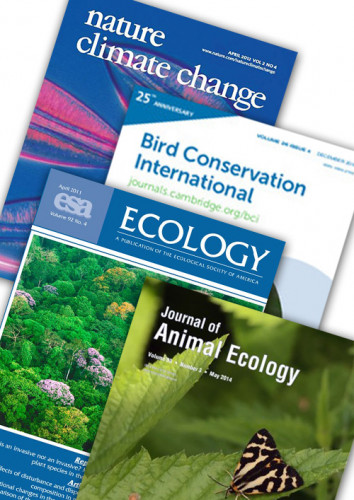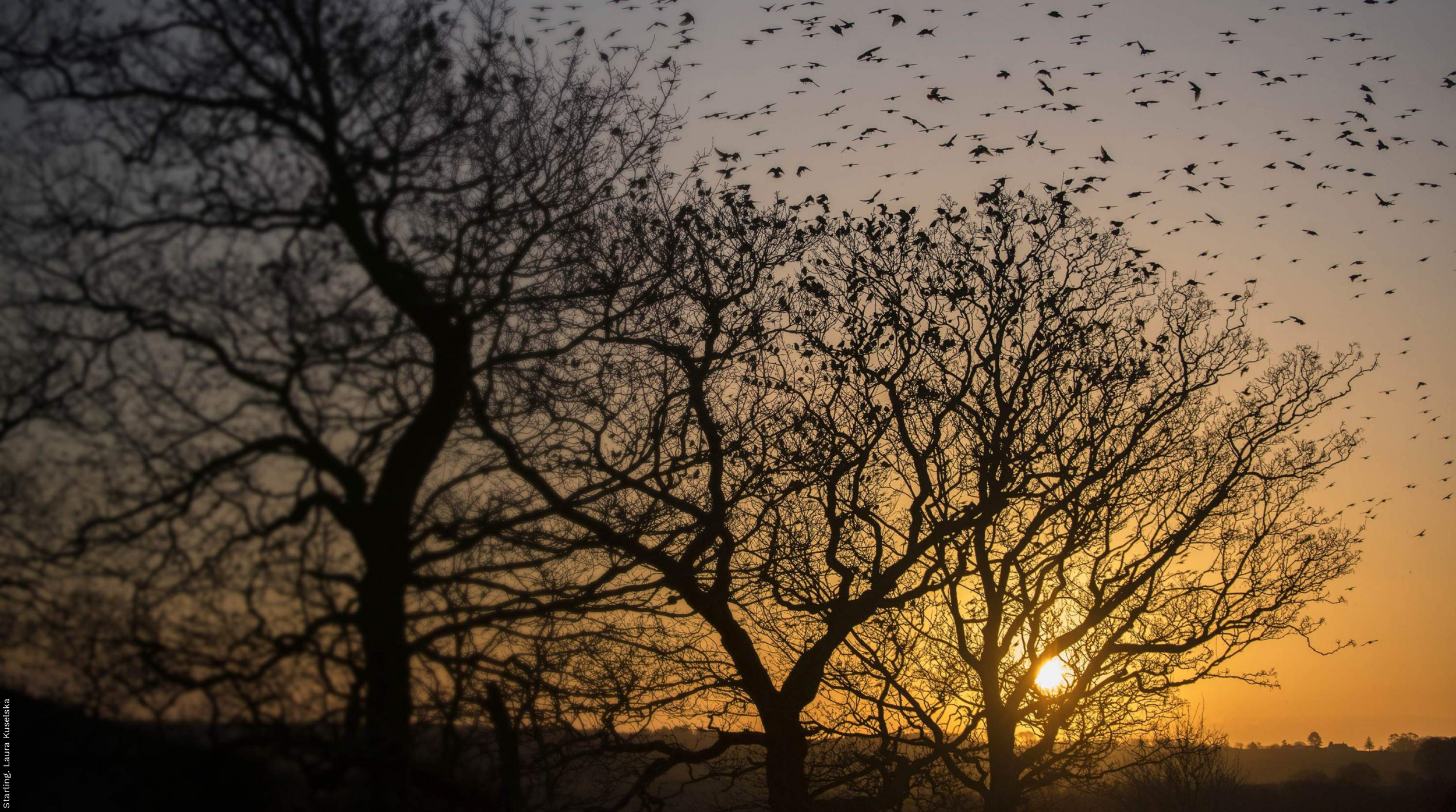Peer-reviewed papers

It is BTO’s policy to make public the results of our research. Our aim is to publish as much as possible of our work in the peer reviewed scientific literature. Many results are also published in our BTO Research Report series.
2016.
Survival estimates of Northern gannets Morus bassanus in Alderney: Big data but low confidence.
Bird Study
63 (part 3)
: 380-386
2016.
Passerines may be sufficiently plastic to track temperature-mediated shifts in optimum lay date.
Global Change Biology
Link to Article (DOI: 10.1111/gcb.13302)
2016.
Vegetation structure influences foraging decisions in a declining grassland bird: the importance of fine-scale habitat and grazing regime.
Bird Study
63 (part 2)
: 223-232
Link to Article (DOI: 10.1080/00063657.2016.1180342)
2016.
The winter distribution of the Spoon-billed Sandpiper Calidris pygmaeus.
Bird Conservation International
Link to Article (DOI: 10.1017/S0959270915000295)
2016.
Negative impact of wind energy development on a breeding shorebird assessed with a BACI study design.
Ibis
158 (part 3)
: 541-555
Link to Article (DOI: 10.1111/ibi.12364)
2016.
Predicting when climate-driven phenotypic change affects population dynamics.
Ecology Letters
Link to Article (DOI: 10.1111/ele.12599)
2016.
Incorporating movement in species distribution models: how do simulations of dispersal affect the accuracy and uncertainty of projections?.
International Journal of Geographical Information Science
30
: 2 050-2 074
Link to Article (DOI: 10.1080/13658816.2016.1158823)
2016.
Consistent response of bird populations to climate change on two continents.
Science
352
American Association for the Advancement of Science
: 84-87
Link to Article (DOI: 10.1126/science.aac4858)
2016.
Morphology, geographical variation and the subspecies of Marsh Tit Poecile palustris in Britain and Central Europe.
Bird Study
63 (part 1)
: 58-65
Link to Article (DOI: 10.1080/00063657.2015.1132187)
2016.
Changing densities of generalist species underlie apparent homogenization of UK bird communities.
Ibis
158 (part 3)
: 645-655
Link to Article (DOI: 10.1111/ibi.12370)
2016.
Agricultural management and climatic change are the major drivers of biodiversity change in the UK.
PLOS ONE
11 (part 3)
View Abstract
Link to Article (DOI: 10.1371/journal.pone.0151595)
2016.
Contrasting effects of GPS device and harness attachment on adult survival of Lesser Black-backed Gulls Larus fuscus and Great Skuas Stercorarius skua.
Ibis
158 (part 2)
: 279-290
Link to Article (DOI: 10.1111/ibi.12340)
2016.
Are white storks addicted to junk food? Impacts of landfill use on the movement and behaviour of resident white storks (Ciconia ciconia) from a partially migratory population.
Movement Ecology
4
Link to Article (DOI: 10.1186/s40462-016-0070-0)
2016.
Survival of Afro-Palaearctic passerine migrants in western Europe and the impacts of seasonal weather variables.
Ibis
158 (part 3)
: 465-480
Link to Article (DOI: 10.1111/ibi.12366)
2016.
Long-term changes in the migration phenology of UK breeding birds detected by large-scale citizen science recording schemes.
Ibis
158 (part 3)
: 481-495
Link to Article (DOI: 10.1111/ibi.12367)
2016.
Patterns and causes of covariation in bird and butterfly community structure
.
Landscape Ecology
30 (part 8)
: 1 461-1 472
Link to Article (DOI: 10.1007%2Fs10980-015-0199-z)
2016.
An experimental evaluation of the effects of geolocator design and attachment method on between-year survival on whinchats Saxicola rubetra.
Journal of Avian Biology
47
: 530-539
Link to Article (DOI: 10.1111/jav.00871)
2016.
The role of habitat change in driving Black Grouse Tetrao tetrix population declines across Scotland.
Bird Study
Link to Article (DOI: 10.1080/00063657.2015.1134439)
2016.
Understanding Predation. A review bringing together natural science and local knowledge of recent wild bird population changes and their drivers in Scotland.
Moorland Forum
View Abstract
2016.
The increasing importance of monitoring wildlife responses to habitat management.
British Wildlife
27 (part 3)
: 175-186
2016.
Colony size and foraging range in seabirds.
Oikos
125 (part 7)
: 968-974
View Abstract
Link to Article (DOI: 10.1111/oik.02781)
2016.
Avian collision risk models for wind energy impact assessments.
Science Direct
56
: 43-49
View Abstract
Link to Article (DOI: 10.1016/j.eiar.2015.09.001)
2016.
Real-time species distribution models for conservation and management of natural resources in marine environments.
Marine Ecology Progress Series
542
: 221-234
Link to Article (DOI: 10.3354/meps11572)
2016.
Mitigating the Impact of Bats in Historic Churches: The Response of Natterer’s Bats Myotis nattereri to Artificial Roosts and Deterrence.
PLoS ONE
11 (part 1)
View Abstract
Link to Article (DOI: 10.1371/journal.pone.0146782)
2015.
The effect of artificial lighting on the arrival time of birds using garden feeding stations in winter: A missed opportunity?.
Urban Ecosystems
19
: 535-546
Link to Article (DOI: 10.1007%2Fs11252-015-0516-y)
2015.
Do Siskins have friends? An analysis of movements of Siskins in groups based on EURING recoveries.
Bird Study
62 (part 4)
: 566-568
Link to Article (DOI: 10.1080/00063657.2015.1089836)
2015.
Using habitat-specific population trends to evaluate the consistency of the effect of species traits on bird population change.
Biological Conservation
192
: 343-352
View Abstract
Link to Article (DOI: 10.1016/j.biocon.2015.10.009)
2015.
Geographical variation in species' population responses to changes in temperature and precipitation.
Proceedings of the Royal Society B
282
View Abstract
Link to Article (DOI: 10.1098/rspb.2015.1561)
2015.
The geographical range of British birds expands during 15 years of warming.
Bird Study
62 (part 4)
: 523-534
View Abstract
Link to Article (DOI: 10.1080/00063657.2015.1089835)
2015.
Continent-scale global change attribution in European birds - combining annual and decadal time scales.
Global Change Biology early view
View Abstract
Link to Article (DOI: 10.1111/gcb.13097)
2015.
Current status and recent trend of the Eurasian Woodcock Scolopax rusticola as a breeding bird in Britain.
Bird Study
Link to Article (DOI: 10.1080/00063657.2015.1092497)
2015.
Abundance models improve spatial and temporal prioritization of conservation resources.
Ecological Applications
25 (part 7)
: 1 749-1 756
Link to Article (DOI: 10.1890/14-1826.1)
2015.
Can Observation Skills of Citizen Scientists Be Estimated Using Species Accumulation Curves?.
PLoS ONE
10 (part 10)
Link to Article (DOI: 10.1371/journal.pone.0139600)
2015.
Changes in breeding wader populations of the Uist machair between 1983 and 2014.
Scottish Birds
35 (part 3)
: 207-215
2015.
Quantifying turnover in British breeding bird communities.
Journal of Applied Ecology
Link to Article (DOI: 10.1111/1365-2664.12539 )
2015.
Is supplementary feeding in gardens a driver of evolutionary change in a migratory bird species?.
Global Change Biology
21
: 4 353-4 363
View Abstract
Link to Article (DOI: 10.1111/gcb.13070)
2015.
Breeding season weather determines long-tailed tit reproductive success through impacts on recruitment .
Journal of Avian Biology
46
: 441-451
Link to Article (DOI: 10.1111/jav.00560)
2015.
Use of environmental stratification to derive non-breeding population estimates of dispersed waterbirds in Great Britain.
Journal for Nature Conservation
Link to Article (DOI: 10.1016/j.jnc.2015.09.001)
2015.
Organic Farming: Biodiversity Impacts Can Depend on Dispersal Characteristics and Landscape Context.
PLOS ONE
10 (part 8)
Link to Article (DOI: 10.1371/journal.pone.0135921)
2015.
Multi-scale associations with habitat, land use and change: Opportunities and limitations for Whinchats Saxicola rubetra in the uplands of Scotland.
Book title: Living on the edge of extinction in Europe. Proceedings of the first European Whinchat Symposium
: 205-212
2015.
Light-level geolocators reveal migratory connectivity in European populations of pied flycatchers Ficedula hypoleuca.
Journal of Avian Biology
View Abstract
Link to Article (DOI: 10.1111/jav.00721)
2015.
Managing Conflict between Bats and Humans: The Response of Soprano Pipistrelles (Pipistrellus pygmaeus) to Exclusion from Roosts in Houses.
PLOS ONE
10 (part 8)
View Abstract
Link to Article (DOI: 10.1371/journal.pone.0131825)
2015.
Hydrologically driven ecosystem processes determine the distribution and persistence of ecosystem-specialist predators under climate change
.
Nature Communications
6
View Abstract
Link to Article (DOI: 10.1038/ncomms8851)
2015.
Swedish birds are tracking temperature but not rainfall: evidence from a decade of abundance changes.
Global Ecology and Biogeography
24
: 859-872
Link to Article (DOI: 10.1111/geb.12308)
2015.
Geographical range margins of many taxonomic groups continue to shift polewards.
Biological Journal of the Linnean Society
115 (part 3)
: 586-597
View Abstract
Link to Article (DOI: 10.1111/bij.12574)
2015.
Breeding season habitat associations and population declines of British Hawfinches Coccothraustes coccothraustes.
Bird Study
62 (part 3)
: 348-357
View Abstract
Link to Article (DOI: 10.1080/00063657.2015.1046368)
2015.
A novel citizen science approach for large-scale standardised monitoring of bat activity and distribution, evaluated in eastern England.
Biological Conservation
191
: 38-49
View Abstract
Link to Article (DOI: 10.1016/j.biocon.2015.06.009)
2015.
Ecosystem recharge by volcanic dust drives broad-scale variation in bird abundance.
Ecology and Evolution
5 (part 12)
: 2 386-2 396
View Abstract
Link to Article (DOI: 10.1002/ece3.1523)
2015.
Time-in-area represents foraging activity in a wide-ranging pelagic forager.
Marine Ecology Progress Series
527
: 233-246
View Abstract
Link to Article (DOI: 10.3354/meps11262)
2015.
A method to evaluate the combined effect of tree species composition and woodland structure on indicator birds.
Ecological Indicators
55
: 44-51
Link to Article (DOI: 10.1016/j.ecolind.2015.03.007)



Share this page